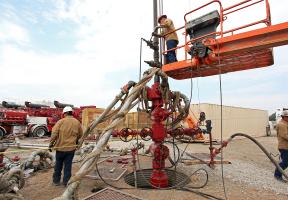Maritime Oil Transportation Safety: A Major Issue
Published on 01.14.201510 min read
Oil companies, ship owners and states all have a role to play in implementing the rules that ensure the safety of oil shipping. Major oil spills have decreased eightfold over a period of 30 years.

© PERRIN GUILLAUME - TOTAL - The Montesperanza, a tanker chartered by Total, departs Le Havre, France on its first voyage.
Maritime Oil Transportation, an Activity Carried Out by Specialized Ship Owners
After the 1973 oil crisis, many oil companies saw their assets transferred to state-run companies, as countries decided they wanted to manage their oil reserves themselves. At the same time, these companies lost control of transportation and closed the subsidiaries that handled crude oil and refined petroleum product shipping. For these historical reasons, most tankers operating today are not owned by oil companies; they only own the ’s cargo. They outsource transportation to specialized ship owners, who outfit the ships and operate them commercially.
When a company needs to transport oil to a refinery or a point of consumption, it contacts the ship owner to charter a tanker. However, vessels are not chosen at random: they must meet very strict safety and security standards.
Safety and Security Criteria for Oil Companies
Every oil company sets its own quality, safety and security criteria, which cover:
- The tanker’s construction and features.
- Tanker condition and maintenance.
- Crew recruitment, training and management.
- Planning of routes and the voyage itself.
Ship owners are responsible for ensuring that their ships meet these criteria. Independent certification organizations known as classification societies inspect vessels on a regular basis and issue a certificate of seaworthiness.
Global Databases
Oil companies periodically appoint specialized inspectors to verify that ship owners are complying with regulations. The companies share the vetting data gathered by inspectors in a computer database such as Ship Inspection Report Exchange (SIRE), set up in 1993. Thousands of new reports are added to these databases every year.
Before choosing a tanker to carry its crude oil, the company checks all information available on it. If it believes the ship is substandard, it may refuse to use it. It may also rule out vessels that are too old and that have received negative inspection reports, or turn down a crew that it believes has not been trained properly.
The Role of States
Oil companies and ship owners are not solely responsible for the safety of maritime oil transportation. Each ship is registered in a country and sails under the flag of that country, which is responsible for checking the ship's condition and onboard practices before issuing its registration.
Many countries take this responsibility seriously. However, some countries register ships cheaply, but without carrying out strict checks on their condition. These are known as flags of convenience.
Despite the safety problems that can occur, maritime oil shipping accidents have fallen steadily. The number of oil spills, defined as more than 700 tons, decreased eightfold between the 1970s and 2000s. These encouraging results have been achieved through the combined efforts of states, companies and ship owners. In fact, almost all the oil transported by sea arrives safely, without problems.

















